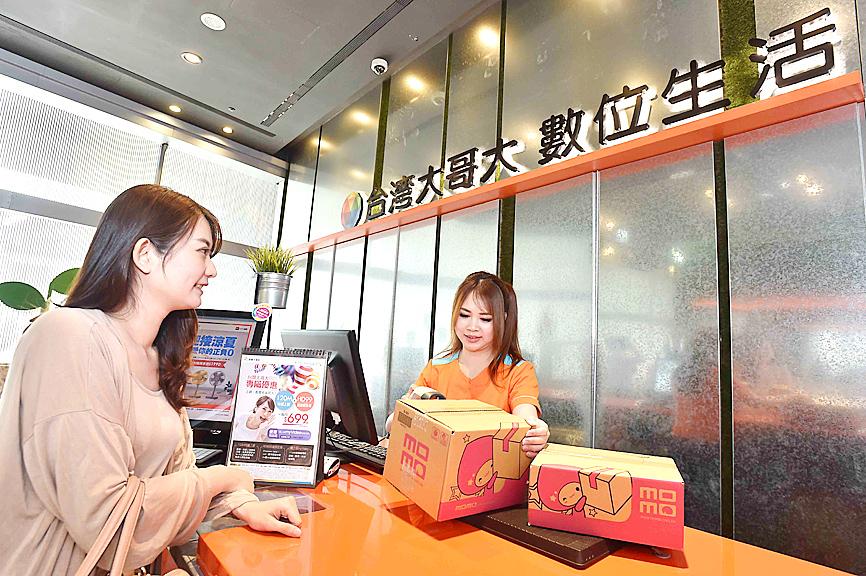Taiwan Mobile Co (台灣大) yesterday said it is working with its e-commerce subsidiary Momo.com Ltd (富邦媒體) to offer 24-hour delivery and pickup services.
The telecom said its pickup services would be available at its 760 brick-and-mortar stores nationwide, and the company aims to cut its normally two-day pickup time to 24 hours after consumers order on Momo.com.
“The 24-hour pickup service is faster than those provided by convenience stores,” Taiwan Mobile said in a statement.

Photo courtesy of Taiwan Mobile Co
The companies started the collaboration last year, allowing customers to pick up electronics, cosmetics or food products they bought on the Internet at Taiwan Mobile’s Myfone retail stores.
Taiwan Mobile said it helped handle about 1,000 deals on average per day last year, adding that the number is accelerating amid the COVID-19 pandemic.
Over the past two months, the number of in-store pickups has grown two times compared with the same period last year, helping retain customers at Myfone stores, the company said.
Taiwan Mobile reported that revenue last month increased 7.2 percent year-on-year to NT$10.61 billion (US$358.64 million) from NT$9.9 billion, with Momo.com contributing to more than half of its revenue. The e-commerce subsidiary last month made NT$5.47 billion in revenue, up about 36 percent from NT$4.03 billion a year earlier.
However, Taiwan Mobile’s net profit last month fell 2.8 percent to NT$1.03 billion from NT$1.06 billion. Earnings per share fell to NT$0.36, from NT$0.38 a year earlier.
In the first six months of this year, Taiwan Mobile’s net profit grew 1.4 percent annually to NT$6.36 billion, with earnings per share of NT$2.26, while revenue rose 6.2 percent to NT$63.19 billion.
Meanwhile, Chunghwa Telecom Co’s (中華電信) net profit slid 0.4 percent to NT$16.86 billion during the first six months, compared with NT$16.92 billion a year earlier, with earnings per share falling from NT$2.18 to NT$2.17. Over the same period, revenue fell 5.4 percent from NT$101.44 billion to NT$95.96 billion.
Far EasTone Telecommunications Co’s (遠傳電信) net profit remained nearly flat at NT$4.41 billion in the first half of the year, or earnings per share of NT$1.35, although revenue fell 3.18 percent year-on-year to NT$38.07 billion from NT$41.25 billion.

CHIP RACE: Three years of overbroad export controls drove foreign competitors to pursue their own AI chips, and ‘cost US taxpayers billions of dollars,’ Nvidia said China has figured out the US strategy for allowing it to buy Nvidia Corp’s H200s and is rejecting the artificial intelligence (AI) chip in favor of domestically developed semiconductors, White House AI adviser David Sacks said, citing news reports. US President Donald Trump on Monday said that he would allow shipments of Nvidia’s H200 chips to China, part of an administration effort backed by Sacks to challenge Chinese tech champions such as Huawei Technologies Co (華為) by bringing US competition to their home market. On Friday, Sacks signaled that he was uncertain about whether that approach would work. “They’re rejecting our chips,” Sacks

NATIONAL SECURITY: Intel’s testing of ACM tools despite US government control ‘highlights egregious gaps in US technology protection policies,’ a former official said Chipmaker Intel Corp has tested chipmaking tools this year from a toolmaker with deep roots in China and two overseas units that were targeted by US sanctions, according to two sources with direct knowledge of the matter. Intel, which fended off calls for its CEO’s resignation from US President Donald Trump in August over his alleged ties to China, got the tools from ACM Research Inc, a Fremont, California-based producer of chipmaking equipment. Two of ACM’s units, based in Shanghai and South Korea, were among a number of firms barred last year from receiving US technology over claims they have

Taiwan’s exports soared 56 percent year-on-year to an all-time high of US$64.05 billion last month, propelled by surging global demand for artificial intelligence (AI), high-performance computing and cloud service infrastructure, the Ministry of Finance said yesterday. Department of Statistics Director-General Beatrice Tsai (蔡美娜) called the figure an unexpected upside surprise, citing a wave of technology orders from overseas customers alongside the usual year-end shopping season for technology products. Growth is likely to remain strong this month, she said, projecting a 40 percent to 45 percent expansion on an annual basis. The outperformance could prompt the Directorate-General of Budget, Accounting and

BARRIERS: Gudeng’s chairman said it was unlikely that the US could replicate Taiwan’s science parks in Arizona, given its strict immigration policies and cultural differences Gudeng Precision Industrial Co (家登), which supplies wafer pods to the world’s major semiconductor firms, yesterday said it is in no rush to set up production in the US due to high costs. The company supplies its customers through a warehouse in Arizona jointly operated by TSS Holdings Ltd (德鑫控股), a joint holding of Gudeng and 17 Taiwanese firms in the semiconductor supply chain, including specialty plastic compounds producer Nytex Composites Co (耐特) and automated material handling system supplier Symtek Automation Asia Co (迅得). While the company has long been exploring the feasibility of setting up production in the US to address